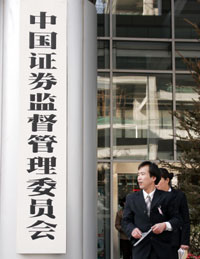China lifted a one-year ban on share sales, letting some publicly traded
companies fund expansion in an economy that grew 10.2 percent in the first
quarter.

A man stands besides
the name placard of the China Securities Regulatory Commission in this
February 22, 2006 file photo. The commission has lifted the year-long ban
on stock sales by listed companies.
[newsphoto] |
Companies must meet 34 criteria to
be eligible to sell shares including three consecutive years of profit and
dividend payments equal to at least 20 percent of income, according to a
statement posted yesterday on the China Securities Regulatory Commission Web
site. Initial public offerings are still prohibited, it said.
The rules cover additional share offerings, convertible bonds, share-purchase
rights offerings and other types of securities but did not specifically mention
IPOs.
They took effect Monday after the markets reopened following a weeklong
national holiday.
New share issues would require regulatory approval and
would likely not begin immediately.
Ending the ban will widen access to
capital and generate underwriting fees for local securities firms. The
government halted sales last May to avoid a glut of equity as it sought to make
more than $200 billion of mostly state-owned stock tradable.
"This is good news as companies are hungry for capital to expand," said Jiang
Jianrong, a Shanghai-based analyst at Shenyin Wanguo Securities Co.
The Composite Stock Index on the Shanghai Stock
Exchange, which comprises yuan-denominated A shares and foreign-currency B
shares, closed at 1,484.1 points, up by 43.9 points, or 3.05 percent. Total
turnover was 15.3 billion yuan (1.9 billion US dollars).
The major index of Shenzhen Stock Exchange, the Shenzhen Component Index, was up
3.5 percent to close at 3,986.23 points, with a total turnover of 8.2 billion
yuan.
"The market is flush with money now, so there is no need to worry about a
sharp decrease in funds," said Simon Wang at Xiangcai Securities.
Panzhihua New Steel & Vanadium Co. and Huaxin Cement Co. Ltd. are
among 42 companies that said they would sell shares or convertible bonds once
the ban was lifted. Listed companies representing 70 percent of China's total
market capitalization have already made their state-owned shares tradable.
China published proposed rules for resuming IPOs on April 28, without setting
a timetable.
About 200 to 300 of China's 1,365 publicly traded companies will be eligible
to sell shares, said Wang Jinxu, an investment banker at China Everbright
Securities Co.
Under the new rules, share sales shouldn't be bigger than 30 percent of a
company's capital before the offering. Companies selling convertible bonds
should cap their total debt after the sale at less than 40 percent of net assets
as of the end of the previous financial year, the statement said.
China
suspended fund-raising activities a year ago as companies began converting
nontradable, mostly government-held shares into tradable equity.
The
nontradable shares once constituted about two-thirds of the market
capitalization in the mainland markets and were a legacy of the state-run,
planned economy.
Officials recently announced that more than 70 percent
of the companies with shares traded on the exchanges have completed the reforms,
allowing new stock offerings to resume.
Analysts said they expected the
partial resumption of share sales to attract more investors to the markets.
Regulators are approaching IPOs more cautiously, given investors' fears that new
shares might flood into the markets, exceeding demand and pushing prices
lower.